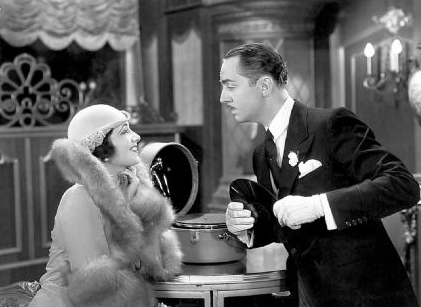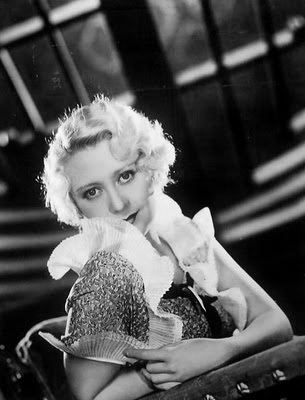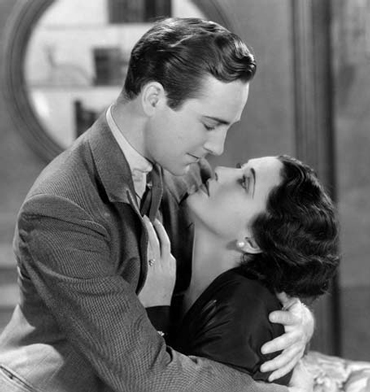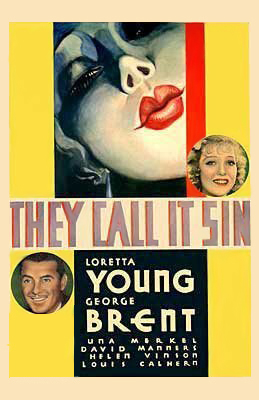
 |
|
|
|
Working for MGM Home Video in 1992, I remember editing a humorous sales promo for a new VHS line called "Forbidden Hollywood". It was an early introduction to the frisky delights of early 1930s movies that hadn't had all the saucy content scalded out by puritanical censors. Desperate to build audiences in the worst years of the Depression, the studios (un-)dressed their heroines in scanty costumes and played naughty games with double-entendre dialogue. When the Production Code was enforced the resulting repression squashed half the life out of Hollywood movies. Subject matter and human activity on screen had to be toned down for the proverbial Sunday School Picnic. Warner Home Video has been first out the gate on DVD with branded lines that actually had some relevance to committed film fans, as in their ongoing film noir collections. The company's first three volumes of Forbidden Hollywood on DVD brought us salacious highlights, but also important examples of films about subjects that the censors swept from the screen -- the true face of poverty, the unfair plight of women, the social problem of drug addiction. A few films even touched on the undercurrent of revolution that was only stemmed by the New Deal. Forbidden Hollywood Volume 4 takes us into sophisticated comedies in situations that the Production Code would never condone, starring some of Warners' most seductive stars. We know William Powell mostly from his Thin Man movies, but here he plays a suave seducer and a corruptible attorney. Kay Francis practically lived in the plush world of these movies; we see her playing opposite Powell and David Manners, a leading man with a perfect '30s profile. We get a saucy turn from Joan Blondell and see Loretta Young juggling the attentions of three suitors. For Volume 4 the series is transferred from a standard DVD release to the Warner Archive Collection -- more on that below. 
All four films are from the election year of 1932, before Roosevelt took office and when (if the books are correct) the 'economic morale' of the country was at low ebb. But not all Pre-code pictures are naturalistic tales of life on the street. Because it stars Kay Francis, Jewel Robbery at first seems to be a knockoff of Ernst Lubitsch's sublimely seductive Trouble in Paradise -- until one realizes that it was released two months before that classic. "The Robber" (William Powell) is the dashing, nervy leader of a gang of Viennese jewel thieves, who cleans out a swank store. He also takes a diamond from customer Teri, a Baroness (Kay Francis). But their meeting begins a lengthy flirtation that equates theft with sex, and diamonds with desire. The Robber slips his loot into Teri's safe (more suggestiveness) and then uses his gang to fake various situations to maneuver Teri into his serial-seducer's bachelor pad. To the Robber's delight, Teri has no intention of remaining faithful to her dull husband. She even sends her present lover packing. Jewel Robbery takes us into a sexy fantasy where a tuxedo-clad thief can't decide whether he seduces women to steal their jewelry, or steals jewelry to meet desirable women. Teri's best friend Marianne (Helen Vinson) is awestruck by the Baroness'es sexual daring, and Kay Francis obliges by addressing her come-on looks directly to the camera. Francis also wears a series of racy gowns that look more like lingerie, and bare her back and shoulders. Did millions of Depression-era women fantasize living such a carefree, erotic lifestyle. The cops bumble about, especially with the incompetent security guard Lenz (Spencer Charters) doing things like carrying the Robber's loot to his car for him. The Robber keeps Lenz and other nitwit law dogs occupied by handing them "funny cigarettes", which turn out to be high-yield marijuana. Drug humor like this didn't return until the late 1960s - it's illuminating to see a specialist in crabby characters like Henry Kolker get the giggles while on the weed. David Niven's urbane jewel thief in the first Pink Panther movie has a hint of William Powell's charm, but by 1963 the Code wouldn't let a mainstream screen lothario walk the walk, so to speak. When Powell's thief sweeps Francis off her feet, she stays swept. An earlier Forbidden Hollywood volume concentrated on William Wellman, and three of these four pictures were directed by William Dieterle. Just a year or so into his American career Dieterle shows an affinity for light & racy fare. Screenwriters Erwin S. Gelsey and Bertram Bloch (the author of Dark Victory) adapted a Hungarian play by Ladislaus Fodor, delivering at least one salacious bon mot per scene. Prepping the Robber's pad for Teri's visit, one of his cohorts orders a helper to close the curtains to an alcove containing a bed: "No, not yet. First they eat." 
William Powell is back in a contrasting role in Lawyer Man, starring opposite the working-class Madonna Joan Blondell. She plays Olga, the faithful secretary to the honest attorney Anton "Tony" Adam (Powell). Tony helps immigrants in a noisy, crowded neighborhood on the Lower East Side. Unstylish but effective in the courtroom, Tony's court victories win him an invitation to partner with Bentley, an established uptown attorney. Things go well enough at first. Bentley's sister Babs (Helen Vinson again) shows a marked interest in Tony, much to Olga's chagrin. But the fancy job unravels when Tony takes a breach of promise case for Ginny St. Johns (Claire Dodd), a flashy showgirl. Ginny turns out to be his undoing -- the whole deal is rigged by political racketeer John Gilmurry (David Landau) as a way of getting back at Tony. Before he knows it, Tony's been indicted for unethical actions. To retaliate, he changes his tune and takes on every crooked case he can get. It's part of a plan to trump Gilmurry one more time. Olga sticks with her boss, but this time he goes way out on a limb. Lawyer Man hasn't any shocking sex content beyond the silken trap Claire Dodd sets for William Powell. But it does give a rather subversive (true?) image of civic corruption. Political boss Gilmurry is only one bad brick in a city where everybody seems to be running some kind of racket. As soon as Tony opposes the entrenched crooks, he's a sitting target. His only real choice is between becoming a rich crook, or an honest poor attorney back in his old neighborhood. Once again under William Dieterle's direction, Powell begins as a neighborhood dweller who wears a suit "that was good in 1919." His character arc is pretty interesting, as he retains his eye for the ladies whether operating as an idealistic loner, a gullible swell or a ruthless predator. Joan Blondell sticks by her man, even though Tony never recognizes that his secretary is perfect romantic partner material. The one other male that shows an interest in her is a casual masher played by none other than Sterling Holloway. 
Man Wanted is the weakest entry in the collection, as it doesn't develop much farther than its opening question -- can a high-powered businesswoman take on a handsome male as her secretary? What happens when they become attracted to each other? The film gambles all on the magnetism between star Kay Francis and David Manners, an actor well known to horror fans from his appearances in the original Dracula, The Mummy and The Black Cat. Manners found success early in James Whale's Journey's End and has a plum role in William Dieterle's first American film, the interesting The Last Flight. Apparently he lost interest in Hollywood, for he quit outright at age 35 and never looked back. In Man Wanted Manners' general appeal seems similar to Ben Affleck or Jon Hamm in Mad Men. His Tommy Sherman runs a sporting goods store with his best buddy Andy (Andy Devine) but jumps ship to become a personal stenographer, then trusted business associate, for magazine executive Lois Ames (Kay Francis). Lois runs her publishing empire night and day, and only infrequently touches base with her philandering husband Freddie (Kenneth Thomson), a polo-playing playboy who parades his latest paramour Ann (Claire Dodd again, that bad girl) practically under Lois's nose. Tommy has a long-suffering girlfriend in Ruth Holman (the adorable Una Merkel). Ruth takes it on faith that Tommy is staying true, but the close association and personal affinity felt by the boss and her assistant take their toll. At a hotel retreat, Tommy decides it's time to make his move. Meanwhile, that rotter Freddie comes to say goodnight to Lois so he can join Ann in her hotel room down the hall. Lois sees his extra key... Actually released before the other William Dieterle pictures, Man Wanted toys with some creative forms of infidelity but opts for a morally conventional wind-up. Not that this is a bad thing - not all Pre-code movies challenged conventional morals -- but since not much else is going on the lack of bedroom developments comes as something of a letdown. David Manner is far more lively than in his walk-through performances in the Universal horror pix, while Kay Francis is convincing as a businesswoman who delights in being in control. Perhaps there is an interesting angle here -- the woman dominates the relationship, and the man does not feel sexually humiliated. 
The final entry They Call It Sin gets us back in the game, so to speak, with a larger cast in a somewhat predictable but thoroughly entertaining show. The woo-bait on view this time is Loretta Young, one of the most beautiful women in early talkie Hollywood. Young apparently didn't just turn heads, her unique combination of facial features stopped men dead in their tracks. Here she plays Marion Cullen, a Kansas girl who plays the organ for church services and can't wait to literally get the hell out of Dodge. Being truly virtuous, leaving seems an impossibility until the visiting businessman Jimmie Decker (David Manners, Young's perfect counterpart in attractiveness) falls in love with her. Their relationship stays chaste when Jimmie exits back to New York, not realizing that Marion is taking practically the next train out. The one itty-bitty detail that Jimmie omits is that he's already engaged to society doll Enid Hollister (perennial fifth wheel Helen Vinson again). When Marion discovers that her hopes are a cruel illusion, she disappears. A few weeks later she resurfaces again on the arm of Broadway impresario Ford Humphries (Louis Calhern), who promotes her songs but really wants to become her lover. Still smitten, Jimmie tries to re-involve himself in Marion's life. The one unselfish man in the equation is Jimmie's friend Dr. Tony Travers (George Brent), who waits quietly for an opportunity to convince Marion that he's the right man for her. The hot title They Call It Sin isn't the best choice for this show, as Loretta Young's character never surrenders her honor, just her pride. Given Ms. Young's virtuous public image, even the fade-out in Kansas with Marion and Jimmie necking doesn't seem to imply sexual relations. The big conflict in the New York section of the film revolves around the womanizer Ford Humphries trying and failing to get Marion into his bed. The script by Lillie Hayward and Howard J. Green sees Marion stifled by the oppressive atmosphere back in Kansas, yet doesn't unduly criticize small-town values. Director Thornton Freeland is little more than a name now, but he also signed RKO's big hit Flying Down to Rio. The film's only conventional target for criticism is show business. Louis Calhern's suave showman Humphries has a constant string of leggy hopefuls lined up outside his office. Adding a needed dash of fun to the proceedings is Una Merkel as Dixie Dare, a novelty dancer who encourages Marion to ambush Humphries for an audition. She ends up getting a job on Marion's coattails. David Manners' Jimmie is a generally a thoughtless dope, making it easy to guess that George Brent's patient and unassuming young doctor will step in at the finale to claim Marion's dance card. They Call It Sin doesn't need compromising situations, lewd dialogue or flashes of skin to weave its erotic spell -- Ms. Young does that on her own.

The four entertaining features in the Warner Archive Collection DVD-R of Forbidden Hollywood Volume 4 all look quite good, with only Jewel Robbery showing a few signs of wear. The WAC has dropped the 'newly remastered' banner on their boxes, probably because almost all of the WB and RKO pictures they're releasing require a new transfer anyway. The result is images better than the prints previously shown on TCM, with much clearer sound. A nice boost for this collection is the inclusion of original trailers that allow us to see exactly what aspects of the films Warners felt were the most exploitable for advertising purposes. The only drawback to the MOD (Made on Demand) business model is that these collector's releases aren't normally encoded with English subs. Vintage Hollywood movie fans with hearing issues are locked out of the fun. It isn't just the WAC -- as a general rule, MOD lines from other studios and the TCM Vault also do without subs. The next Forbidden Hollywood collection, Volume 5 is also out... I'll be getting to it very quickly. I still have about fifteen WAC Crime Does Not Pay short subjects to peruse!
On a scale of Excellent, Good, Fair, and Poor,
Forbidden Hollywood Volume 4 rates:
Reviews on the Savant main site have additional credits information and are often updated and annotated with reader input and graphics. Also, don't forget the 2011 Savant Wish List. T'was Ever Thus.
Review Staff | About DVD Talk | Newsletter Subscribe | Join DVD Talk Forum |
| ||||||||||||||||||